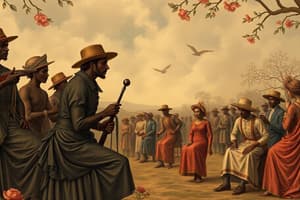Podcast
Questions and Answers
What did the Missouri Compromise of 1820 establish?
What did the Missouri Compromise of 1820 establish?
- No changes to the status of states
- Maine as a slave state
- Missouri as a slave state and Maine as a free state (correct)
- Missouri as a free state
What is sectionalism?
What is sectionalism?
The belief that a person's region was superior to other sections of the country.
Who was Henry Clay?
Who was Henry Clay?
A Speaker of the House who negotiated compromises over slavery's extension.
The Dred Scott decision affirmed Congress's authority to prohibit slavery in certain territories.
The Dred Scott decision affirmed Congress's authority to prohibit slavery in certain territories.
The Missouri Compromise banned slavery north of the _____ degrees north latitude line.
The Missouri Compromise banned slavery north of the _____ degrees north latitude line.
What does the 5th Amendment imply in the context of the Missouri Compromise?
What does the 5th Amendment imply in the context of the Missouri Compromise?
Flashcards are hidden until you start studying
Study Notes
Missouri Compromise of 1820
- Established Missouri as a slave state and Maine as a free state to maintain balance between North and South.
- Aimed to ease tensions but ultimately led to increased conflict over slavery.
- Marked a significant political compromise that lasted about thirty years.
Sectionalism
- Represents a belief in the superiority of one's regional identity over national unity.
- Tension primarily existed between the North and South, with the West developing its own identity.
- The West was open to aligning with either North or South depending on economic interests.
Henry Clay
- Returned to the House of Representatives, serving as Speaker.
- Played a key role in negotiating compromises regarding the spread of slavery.
- Involved in addressing Missouri's request for statehood in 1818, which included the contentious issue of slavery.
Dred Scott Decision
- Supreme Court ruled that Congress had no authority to regulate slavery in territories beyond Missouri and above the 36°30′ latitude.
- The decision was pivotal in escalating tensions surrounding the legality of slavery in the territories.
36°30′ North Latitude
- Defined a boundary in the Missouri Compromise prohibiting slavery north of this latitude line.
- Established a clear geographic line that contributed to sectional tensions leading up to the Civil War.
5th Amendment
- Related to the conflict over slavery extension and states' rights.
- The Dred Scott decision referenced the principle of "dual sovereignty," contending that Scott was denied due process in relation to the 5th Amendment.
- Highlighted conflicts between free and slave states resulting from the Missouri Compromise and its implications.
Studying That Suits You
Use AI to generate personalized quizzes and flashcards to suit your learning preferences.




